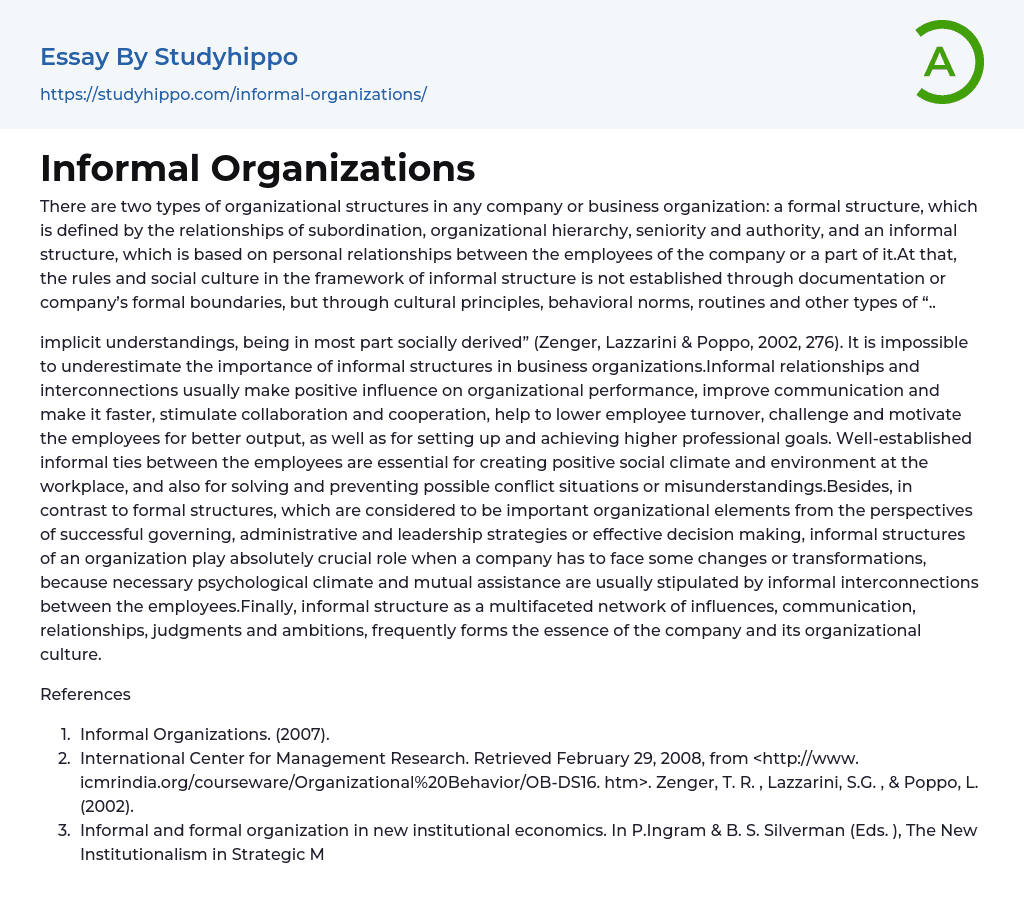There are two types of organizational structures in any company or business organization: a formal structure and an informal structure. The formal structure is defined by subordination, organizational hierarchy, seniority, and authority. The informal structure is based on personal relationships between employees. Unlike the formal structure, the rules and social culture in the informal structure are not established through documentation or company boundaries, but through cultural principles, behavioral norms, routines, and other types of implicit understandings that are socially derived (Zenger, Lazzarini & Poppo, 2002). The importance of informal structures in business organizations cannot be underestimated. Informal relationships and interconnections have a positive influence on organizational performance by improving communication, stimulating collaboration and cooperation, lowering employee turnover, challenging and motivating employees for better output, and helping them to set and achieve higher professional goals.The presence of strong informal relationships among employees is crucial for establishin
...g a positive social climate and environment in the workplace, as well as for resolving and preventing conflicts or misunderstandings. Unlike formal structures, which are important for successful governance, administration, leadership, and decision-making, informal structures within an organization play a vital role during periods of change or transformation, as they foster the necessary psychological climate and mutual assistance. Ultimately, the informal structure, which encompasses influences, communication, relationships, judgments, and ambitions, often defines the essence of the company and its organizational culture.
References
- Informal Organizations.(2007).
- International Center for Management Research.Retrieved February 29, 2008, from <http://www.icmrindia.org/courseware/Organizational%20Behavior/OB-DS16.htm>.Zenger, T.
R. , Lazzarini, S.G., and Poppo, L. (2002). Informal and formal organization in new institutional economics. In P.Ingram and B.S.
The book "The New Institutionalism in Strategic Management" by Silverman (Eds.) i
published by Elsevier Science and spans from page 275 to page 303.
- Being A Leader essays
- Servant Leadership essays
- Leadership Experience essays
- Leadership Qualities essays
- Board Of Directors essays
- Brand Management essays
- Business Ethics essays
- Business Management essays
- Change Management essays
- Comparative Analysis essays
- Decision Making essays
- Dispute Resolution essays
- Knowledge Management essays
- Leadership essays
- Leadership and Management essays
- Manager essays
- Operations Management essays
- Performance Management essays
- Product Management essays
- Project Management essays
- Quality Management essays
- Risk essays
- Risk Management essays
- Scientific Management essays
- Stress Management essays
- supply chain management essays
- Time Management essays
- Total Quality Management essays
- Business Analysis essays
- Business Plan essays
- Community Development essays
- Competition essays
- Effective Leadership essays
- Leadership Styles essays
- Mission Statement essays
- Negotiation essays
- Outsourcing essays
- Planning essays
- Public relations essays
- Reasoning essays
- Strategic Management essays
- Strategic Planning essays
- Swot Analysis essays




